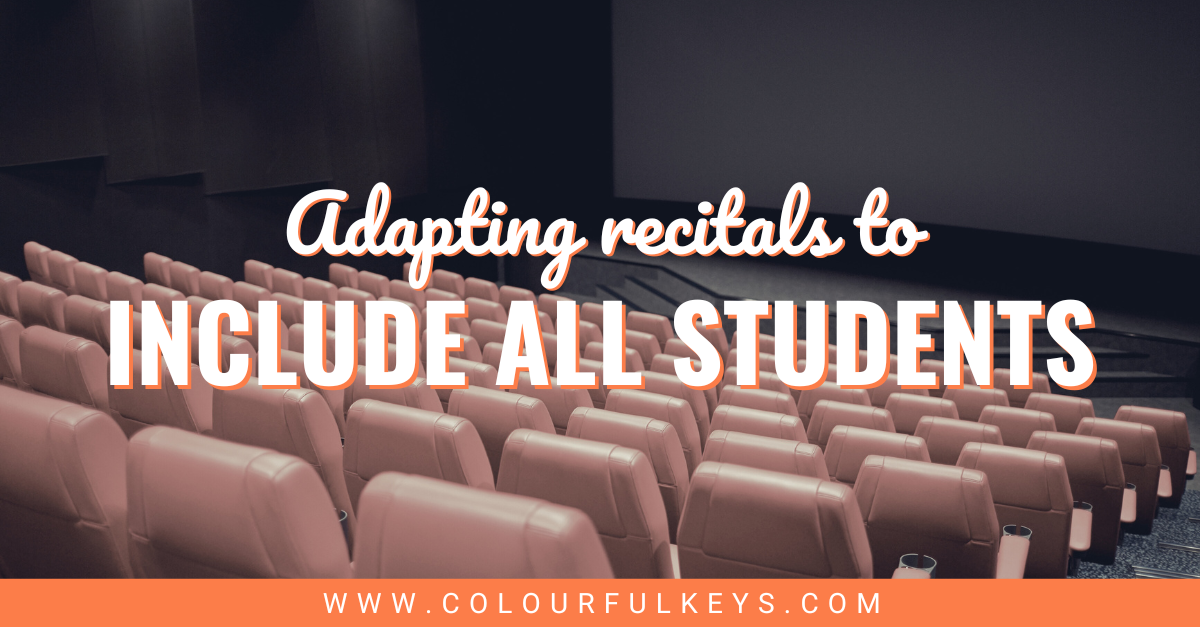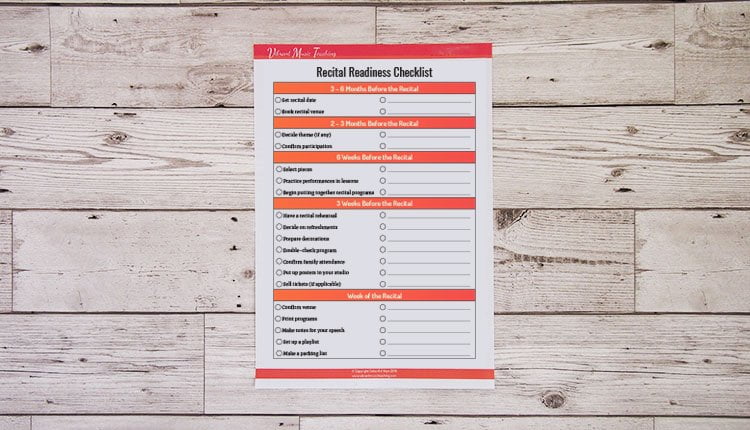
This article about inclusive piano recitals was written by Rosemarie Penner. Rosemarie is an analytical creative … plus an online piano teacher and composer at ‘Must Love Music’! She loves to make learning simple, fun and interactive. When not writing articles (like this one), she enjoys reading and playing video games. For creative ideas and resources, visit Must Love Music.
It’s easy to say that piano recitals are a necessary part of running a studio. But the decisions you make in the process say a lot about your real (and possibly unconscious) reasons for hosting piano recitals in your studio, and what you can consider to make them more inclusive.

Thankfully with a few direct questions and strategies, you can ensure your piano recitals fulfill your goals, fit your diverse studio community and support every student’s abilities and needs.
Consider Your Recital “Why”
With so many types of events within a studio, why has the piano recital become the event that rules them all?
My Recital Rationale
Each teacher has their own reasons for hosting recitals. Personally I like to have recitals in order to:
- Celebrate student progress, especially in our spring recital when my students share their original compositions!
- Reinforce studio community. Because we’re online, recitals build our supportive and inclusive environment.
- Market for new students. Performers sometimes invite friends who later join our studio community.
Because of these reasons, I make sure every aspect of our recitals is focused on showcasing what success looks like for each and every student.
What’s your recital “why”?
There are no wrong answers, but fully understanding your “why” will tell you a lot about the best type of recital you should have, and how to approach it.
By looking at your motivations, you can better discern how to adapt so you can support all of your students, no matter their level or need. You may even decide there are other performance opportunities that are more suitable for you and your students.
Supporting Piano Students’ Needs for Inclusive Recitals
Now that you’ve pondered your recital “whys”, you can honour the reasons you want to hold a recital.
If your piano recitals are to be truly inclusive, start by asking yourself questions like these:
- Does every student have to perform live for the recital?
- Is performing required in order to be a part of your studio community?
- Why do you believe this?
It’s easy to quickly answer, “yes”, “yes” and “because”. I know I’ve done so in the past.
But when I did the hard work of challenging my preconceived notions, the way I supported my students and their families became more effective, and less stressful for everyone.
Visit the Colourful Keys ‘Studio Business’ page for more tips and tricks to help you with your next recital.
Considering Religious Implications
You may have students who don’t perform in music recitals for religious reasons. This is why my studio’s “Christmas” recital became a “Winter” recital, and any students who want to learn Christmas material do so during lesson time instead.
Simply changing the theme made my recitals more inclusive of everyone.

But if a Christmas-themed recital is important to you, you may have to accept that some students may never perform at this particular event.
Including Students With Anxiety or Extreme Shyness
I have a certain affinity for students who have anxiety or are extremely shy.
When I attended large gatherings as a child, I used to mumble “hello” while looking down at the floor, and get out of the room as fast as possible. While it’s gotten easier over the decades, I still use strategies I’ve learnt to deal with anxiety (both from overthinking and from social situations).
Although the root causes of anxiety and shyness can be different, there are some overlapping tactics you can use to bolster students who struggle with these issues.
Talk with your student and their parents (as appropriate) about ways they feel comfortable being involved. Maybe the idea of being on stage – literally in the spotlight – is just too much, but other roles might be the perfect fit.
You have a million tasks on your recital checklist. Is there something your shy or anxiety-ridden student would feel comfortable taking off your to-do list? If so, allow them to take charge of that task. Once completed, be sure to brag about them in any way they’d be comfortable with.
Don’t have a recital checklist of your own? Enter your info below and we’ll send you a great one.

Subscribe to updates and get the Recital Readiness Checklist
Enter your details to subscribe to the newsletter for piano teachers with information, tips and offers.
I hate spam as much as you do! I’ll only send you information that’s directly relevant to music teachers and you can unsubscribe at any time.
Vibrant Music Teaching members can download the checklist from the Printable Library. Not a member? Check out all the benefits and join today at vibrantmusicteaching.com.
Reimagine Music Recital Roles
“Front-of-house” positions are perfect for students who have extreme performance anxiety. Talk with these students to see if they might feel comfortable fulfilling supporting roles. They could:
- Hand out programs, compliment cards and pencils (and gather them at the end)
- Take charge of microphone hand-offs when students do introductions
- Distribute thank you gifts at the end of the recital to each family or attendee
For students who are extremely shy, “behind-the-scenes” roles might be more appropriate. These roles could include:
- “Lights and sound” person (if your venue allows for this)
- Graphic designer for the invitations, recital programs, compliment cards, etc.
- Hospitality host who stocks and restocks refreshments
- Teacher tapper subtly lets you know if it looks like someone is leaving so you can say goodbye
- Cell phone holder takes charge of your phone so they can respond to the “We need to move to the backup plan!” text you may receive. (More on that below👇)
Rethink the Performance
For anxious or shy students who want to perform but need out-of-the-box options, try one of these ideas.
- Pre-record their performances, then show the recording live during the event.
- Play a duet with the teacher. (This works especially well when the piano is angled so the student doesn’t see the audience, and you sit on the audience-side of the bench.)
While I typically wouldn’t recommend “hiding” a student during a performance, this might be an in-between step from not performing at all to playing live at the event.
Build a Backup Plan
Sometimes anxiety gets to be too much for certain students. You may not find out they’re unable to perform until the day of the event, or even a few minutes before they’re supposed to perform at the recital.
If your student has opted to play, work together well in advance to create a backup plan which gives them a better sense of control. If a parent is involved, be sure they know what the plan is and how to implement it.
Some “plan B” ideas include:
- Record many videos of your student playing their pieces both during and in between lessons. Use the best recording as a non-live performance. (These wouldn’t need to be “official” recordings, if that would cause undue stress.)
- Take over introducing your student and sit beside them at the piano while they play.
- Create a type of duet where you play the challenging sections of the piece and your student plays only sections they feel super confident with.
Thanks to having backup plans, I don’t stress like I used to. Even when one mum texted me 3 days before our winter recital to let me know her son (our headliner) had been sick all night. Thankfully, he recovered quickly and was able to put on a fantastic performance. But it was nice to know we already had a plan that would’ve worked out just fine.
Involving Students With Unique Learner Needs
I’ve been fortunate to work with students with neurodivergent and other unique learner needs my whole career. And it has led to some unforgettable recital experiences!
Years ago, one of my teen students turned to the audience and said, “I’m sorry; I need to play that song again.” It still brings a smile to my face because it’s so indicative of the inclusive, supportive studio community we have, even in a situation that was quite out of the norm.

However, piano recitals can be challenging for students who don’t fit the typical learning mode. Thankfully, you can use several of the strategies listed above or use some of the more specific ideas below.
Sensory Overload
For students who easily experience sensory overload, merely attending the piano recital is a big step forward.
One of my students wore headphones to several recitals and chose to sit at the back of the room with his family. This allowed him to cheer on his sister, but also easily leave the room in a non-disruptive way if needed.
Fast forward a few years and he is one of my most confident performers!
Neurodivergent or Dexterity Challenges
A piano recital can be all the more stressful for students who already find it difficult to learn new pieces. This can sometimes be due to learner or dexterity challenges. When that’s the case, adapt by using of these ideas:
- Repertoire selection. Choose pattern-based pieces that are a level below what the student can typically play. This allows for the extra neuroprocessing power needed during a performance situation.
- Start earlier than you normally would. Don’t be afraid to start weeks in advance and take breaks from the piece as needed.
One of my students on the autism spectrum wanted to start learning ACDC’s ‘Thunder’ 10 months before our recital. He spent several months during that time building the dexterity necessary to play the iconic accompaniment pattern.
The sooner-rather-than-later timing was a smart choice.

How will you adapt your piano recitals to be more inclusive?
Tell us about it in the comments below.